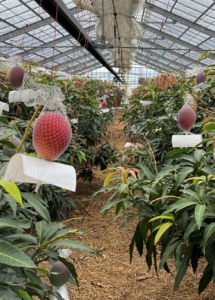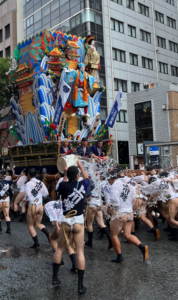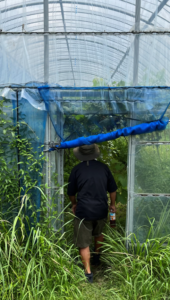
Josh Feng
University of California, Berkeley
(JSPS Summer Program 2023, Kyushu University) |
|
Cultivating Connections: A Summer of Research in Kyushu During the summer of 2023, I had the privilege of spending ten weeks in Japan as a JSPS Summer Program fellow, hosted by Professor Furukawa Fukachi at Kyushu University. As a PhD student in Sociocultural Anthropology at UC Berkeley, my research centers on Japan’s luxury fruit market, particularly the cultivation, branding, and circulation of mangoes produced in Miyazaki, within the broader context of rural revitalization (chiiki kaseika) efforts across the countryside. With Japan facing extreme rates of depopulation and rural-to-urban migration, my research asks how the concept of the “local” is constructed and marketed through food, from the perspectives of local farmers, prefectural governments, and urban consumers. My guiding question: How does something come to be “from” a place? Although I had lived in Fukuoka for several years as a translator and consultant in local craft tourism, this fellowship marked my first opportunity to dive deeply into research on the fruit industry—a new yet familiar exploration of Kyushu’s intricate landscapes. During my JSPS tenure, I split my time between Fukuoka and Miyazaki. I spent about a month based in Fukuoka, attending seminars at Kyushu University in sociocultural anthropology, then devoted another month to Miyazaki, where I visited farms and interviewed mango growers and others involved in agriculture and tourism. Upon arriving in Miyazaki, I quickly connected with local mango farmers and a beekeeper who supplies bees for pollinating greenhouse-grown plants. These key interlocutors introduced me to other producers in Miyazaki, especially young people returning to their home prefecture to try innovative approaches in agriculture and regional revitalization. For example, I visited a natural wine farm owned by a local who had studied winemaking in New Zealand before returning to Miyazaki. Through these visits, I learned not only about the intricate cultivation processes behind Miyazaki mangoes and other local produce, but also about the relationships that connect farms and local communities in a broader social ecosystem — one that includes plants, people, and cultural practices.
Additionally, I conducted comparative research on other agricultural initiatives in the broader Northern Kyushu area while I was based in Fukuoka. These opportunities were facilitated by my previous work experience. For instance, I visited a blueberry farm in Omuta, where I spoke with the owner’s daughter about the challenges of inheriting the business and their efforts to attract tourists through farm visit experiences. In Hagi, Yamaguchi, I met with officials from the fisheries and agriculture bureau and visited the local fish market to learn how they promote local products to both domestic and foreign tourists. As a scholar of sociocultural anthropology focusing on Japan, my research itself could be seen as a “cultural experience.” Through my networks with farmers, I attended local dinners, gatherings, and even a karaoke contest hosted by one of the farms. I also spent time with locals, visiting beaches and other places in Miyazaki. These unexpected encounters enriched my research and became an integral part of the anthropological process. Outside of my fieldwork, I attended Fukuoka’s famous Yamakasa Festival and took a trip to Takachiho Gorge with former coworkers from my time working in Fukuoka, along with many other activities that gave me glimpses into life and culture in Kyushu. Toward the end of the fellowship, I had the opportunity to present my research at a Kyushu University conference (九州人類学研究会・8月5日研究集会). My presentation, titled 「宮崎マンゴーの事例から見た地域性の形成 ―― 温室栽培、観光振興と南国らしさ」, was an hour-long session followed by comments from Professor Akamine Jun of Hitotsubashi University and a 30-minute Q&A with an audience of Japanese professors, researchers, and graduate students. This experience, combined with the time I spent in seminars at Kyushu University, provided a valuable opportunity to learn more about the academic community in Japan. Engaging in these conversations, both formal and informal, gave me valuable insights into how my research fits within the broader context of anthropology in Japan. Moving forward, I hope to continue exchanging knowledge not only with the local communities where I conduct fieldwork but also through bilingual research collaborations with Japanese anthropologists. The preliminary research and connections developed through the JSPS program have laid a strong foundation for my future fieldwork in Japan, where I aim to conduct long-term ethnographic research. Insights from my time in Miyazaki and Fukuoka also inspired preliminary fieldwork I conducted in the summer of 2024 in Okinawa and Hokkaido, where I examined comparative cases of luxury mango production and conducted archival research in Tokyo on the history of greenhouse fruit cultivation in Japan. The JSPS fellowship was not only an important first step in my dissertation research, but also an eye-opening exchange with Japanese scholars that has deepened my commitment to cross-cultural dialogue and research exchange between academia in the United States and Japan. I look forward to continuing this work in the years to come. |
MENU
Josh Feng
- HOME »
- Voice of a Former Fellow »
- Josh Feng











